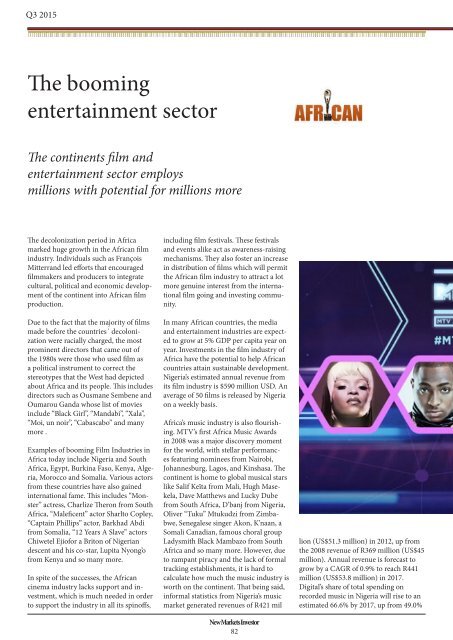Q3 2015The boomingentertainment sectorThe continents film andentertainment sector employsmillions with potential for millions moreThe decolonization period in Africamarked huge growth in the African filmindustry. Individuals such as FrançoisMitterrand led efforts that encouragedfilmmakers and producers to integratecultural, political and economic developmentof the continent into African filmproduction.Due to the fact that the majority of filmsmade before the countries´ decolonizationwere racially charged, the mostprominent directors that came out ofthe 1980s were those who used film asa political instrument to correct thestereotypes that the West had depictedabout Africa and its people. This includesdirectors such as Ousmane Sembene andOumarou Ganda whose list of moviesinclude “Black Girl”, “Mandabi”, “Xala”,“Moi, un noir”, “Cabascabo” and manymore .Examples of booming Film Industries inAfrica today include Nigeria and SouthAfrica, Egypt, Burkina Faso, Kenya, Algeria,Morocco and Somalia. Various actorsfrom these countries have also gainedinternational fame. This includes “Monster”actress, Charlize Theron from SouthAfrica, “Maleficent” actor Sharlto Copley,“Captain Phillips” actor, Barkhad Abdifrom Somalia, “12 Years A Slave” actorsChiwetel Ejiofor a Briton of Nigeriandescent and his co-star, Lupita Nyong’ofrom Kenya and so many more.In spite of the successes, the Africancinema industry lacks support and investment,which is much needed in orderto support the industry in all its spinoffs,including film festivals. These festivalsand events alike act as awareness-raisingmechanisms. They also foster an increasein distribution of films which will permitthe African film industry to attract a lotmore genuine interest from the internationalfilm going and investing community.In many African countries, the mediaand entertainment industries are expectedto grow at 5% GDP per capita year onyear. Investments in the film industry ofAfrica have the potential to help Africancountries attain sustainable development.Nigeria’s estimated annual revenue fromits film industry is $590 million USD. Anaverage of 50 films is released by Nigeriaon a weekly basis.Africa’s music industry is also flourishing.MTV’s first Africa Music Awardsin 2008 was a major discovery momentfor the world, with stellar performancesfeaturing nominees from Nairobi,Johannesburg, Lagos, and Kinshasa. Thecontinent is home to global musical starslike Salif Keïta from Mali, Hugh Masekela,Dave Matthews and Lucky Dubefrom South Africa, D’banj from Nigeria,Oliver “Tuku” Mtukudzi from Zimbabwe,Senegalese singer Akon, K’naan, aSomali Canadian, famous choral groupLadysmith Black Mambazo from SouthAfrica and so many more. However, dueto rampant piracy and the lack of formaltracking establishments, it is hard tocalculate how much the music industry isworth on the continent. That being said,informal statistics from Nigeria’s musicmarket generated revenues of R421 mil<strong>New</strong> <strong>Markets</strong> <strong>Investor</strong>82lion (US$51.3 million) in 2012, up fromthe 2008 revenue of R369 million (US$45million). Annual revenue is forecast togrow by a CAGR of 0.9% to reach R441million (US$53.8 million) in 2017.Digital’s share of total spending onrecorded music in Nigeria will rise to anestimated 66.6% by 2017, up from 49.0%
Q3 2015in 2008. The industry produces over550 albums of different kinds of musicannually, record sales have more thantripled in the past five years and industrystakeholders have projected that thecountry’s entertainment industry wouldhit one billion dollars by 2016.Africa is a market with great long-termpotential. It is in the interests of government,rights holders, artists and the technologyindustry that the digital divide inAfrica is tackled, opening up an excitingnew market. If the governments can alsobe persuaded to establish fair rules togovern unfair competition from unlicensedservices before broadband penetrationlevels soar, it could dramaticallyhelp the digital music market to flourish.South Africa has a key role to play indriving the broader African industry intoan age of increasing digital revenues.NollywoodWith more than a million people, Nollywoodis the country’s second largestemployerAs an entrepreneur, 32-year-old chemistrygraduate Jason Njoku achievedsuccess in a most unlikely way: he isAfrica’s largest distributor of Nigerianmovies, and has raked in over $8 millionsince 2010, when he founded the companyIroko Partners. In December 2012he captivated an audience at a conferencein Texas, United States, as he narratedthe story of his success after failures in<strong>New</strong> <strong>Markets</strong> <strong>Investor</strong>83some other business ventures. Mr. Njokucurrently has 71 employees in Lagos,London and <strong>New</strong> York, and often boaststhat “these people are working for us ina country with 50% unemployment.” Hewas recently listed by Forbes, an Americanbusiness magazine, as one of the top10 young African millionaires to watch.The Nigerian film industry is undoubtedlyhelping create jobs in a country withan economy that relies mainly on oil andagriculture. Over a million people arecurrently employed in the industry, makingit the country’s largest employer afteragriculture. Although Nigeria’s economywill grow by 7% this year, according tothe African Development Bank, insufficientjobs for a growing youth populationcontinue to be a huge concern.<strong>New</strong> job creationThe Nigerian film industry, also knownas Nollywood, produces about 50 moviesper week, second only to India’s Bollywood—morethan Hollywood in theUnited States. Although its revenuesare not on par with Bollywood’s andHollywood’s, Nollywood still generatesan impressive $590 million annually.Believing that if the industry is properlymanaged, a million more jobs could becreated in the sector.In 2010, the Nigerian governmentcreated a $500 million loan facility, theNigerian Creative and Entertainment IndustryStimulation Loan Scheme, backedby the African Development Bank, whichincluded $200 million for Nollywood,distributed through the Bank of Industryand Nexim Bank.Chioma Nwagboso, a World Bankfinance and private sector specialist,says that the Bank understands the jobcreation potential of the Nigerian filmindustry and the need for a “fruitfulexport for the country.” “Without initialsupport from the government, Nollywoodpropelled itself to the position itoccupies today, and a little lift could take
- Page 1 and 2:
Q3 2015Q3 2015Issue 3 Vol.10New Mar
- Page 3 and 4:
Q3 2015
- Page 5 and 6:
Q3 2015Energy20 Renewable energyAfr
- Page 7 and 8:
New Markets Investor7Q3 2015
- Page 9 and 10:
New Markets Investor9Q3 2015
- Page 11 and 12:
New Markets Investor11Q3 2015
- Page 13 and 14:
New Markets Investor13Q3 2015
- Page 15 and 16:
Q3 2015: “Once we have the infras
- Page 17 and 18:
New Markets Investor17Q3 2015
- Page 19 and 20:
Q3 2015investment projects, or a pr
- Page 21 and 22:
Q3 2015provide a semblance of inves
- Page 23 and 24:
New Markets Investor23Q3 2015
- Page 25 and 26:
Q3 2015SEACO M is not, however, res
- Page 27 and 28:
Q3 2015WEF Africa 2015Africa Compet
- Page 29 and 30:
New Markets Investor29Q3 2015
- Page 31 and 32: Q3 2015Bumbuna Hydroelectric Projec
- Page 33 and 34: New Markets Investor33Q3 2015
- Page 35 and 36: Q3 2015nations, South Africa may be
- Page 37 and 38: Q3 2015The development of Africanma
- Page 39 and 40: Q3 2015FoodCurrently, food dominate
- Page 41 and 42: Q3 2015a regular basis. Ghanaian Gr
- Page 43 and 44: Q3 2015NigeriaFoodThe Nigerian reta
- Page 45 and 46: New Markets Investor45Q3 2015
- Page 47 and 48: New Markets Investor47Q3 2015
- Page 49 and 50: New Markets Investor49Q3 2015
- Page 51 and 52: Q3 2015and are prepared to work in
- Page 53 and 54: New Markets Investor53Q3 2015
- Page 55 and 56: Q3 2015Africa’s largest, most vib
- Page 57 and 58: Q3 2015Côte d’IvoireIvory Coast
- Page 59 and 60: Q3 2015NigeriaFrom a political risk
- Page 61 and 62: Q3 2015SunPower designedand is cons
- Page 63 and 64: Q3 2015indirectly, become voluntary
- Page 65 and 66: New Markets Investor65Q3 2015
- Page 67 and 68: Q3 2015the result being to clear th
- Page 69 and 70: Q3 2015ManagementEducation witha Pr
- Page 71 and 72: New Markets Investor71Q3 2015
- Page 73 and 74: Q3 2015A smart, inter-connected urb
- Page 75 and 76: Q3 2015Naivasha, KenyaCasablanca, M
- Page 77 and 78: New Markets Investor77Q3 2015
- Page 79 and 80: Q3 20152014. This sets Nigeria’s
- Page 81: Q3 2015The Lilygate Lekki reception
- Page 85 and 86: New Markets Investor85Q3 2015
- Page 87 and 88: Q3 2015Adesina promisedto work hard
- Page 89: Q3 2015Sectors in vogue with foreig
- Page 92 and 93: Q3 2015New Markets Investor92
- Page 94 and 95: Q3 2015equity investment. She estim
- Page 96: Q3 2015New Markets Investor96









